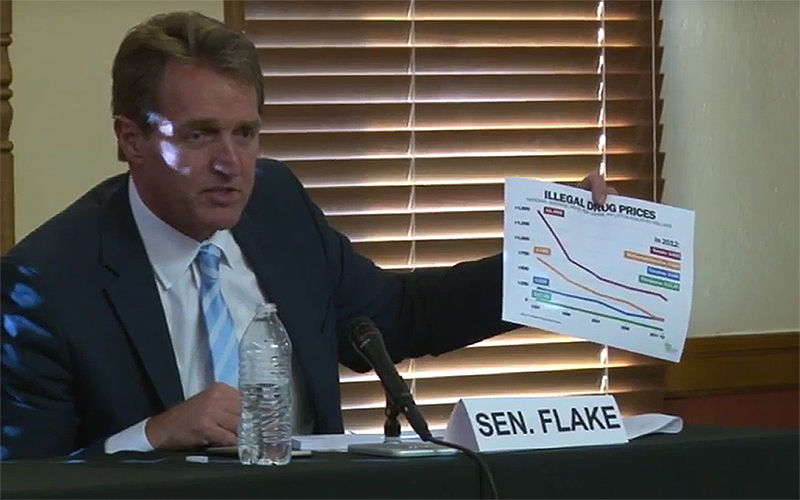
Arizona Sen. Jeff Flake attended a Homeland Security field hearing along with other Arizona officials Monday to discuss the problems with heroin in the state. (Photo by Jennifer Soules/Cronkite News)
Arizona started a program in September to combat drug smuggling on the border and the state needs more money and resources to move the plan forward, Gov. Doug Ducey said at a Homeland Security field hearing on Monday.
“For the first time, in recent memory we have a plan that can yield, real, meaningful results in this effort,” Ducey said. “[We need] more funding, more assets, more planes, helicopters, radios, and equipment added to our arsenal. We need more troopers, analysts, pilots, people to gather intelligence on these criminals and people to take them down.”
The Homeland Security Committee field hearing on ‘America’s Heroin Epidemic at the Border: Local, State, and Federal Law Enforcement Efforts to Combat Illicit Narcotic Trafficking,’ brought together several officials, such as Ducey, Sen. John McCain, Sen. Jeff Flake, Customs and Border Protection Commissioner Richard Gil Kerlikowske and Sen. Ron Johnson from Wisconsin, to discuss the logistics of the growing epidemic.
Related stories:
Hooked: Heroin’s Hold on Arizona
Heroin’s deadly grip claims another young addict
As more pregnant women use heroin, meth, other drugs, more babies suffer the consequences
“The threat to Arizona is not just as a drug corridor, these drugs stay in our state poisoning our children and doing great harm to our communities,” McCain said.
According to the Arizona Department of Health Services, heroin related deaths increased from less than 50 in 2004 to almost 200 in 2014.
“The root cause we do not have a secure border is [because of] America’s insatiable demand for drugs,” Johnson said.
In September, Ducey introduced the Arizona Border Strike Force Bureau, which focuses on bringing together different organizations in order to stop the drug problem at its root.
“The mission is to partner with local and federal agencies to deter, disrupt and dismantle organizations responsible for smuggling drugs and humans into Arizona,” Ducey said.
“A successful long term strategy to take the fight to the cartels requires multi-layered collaboration and cooperation,” he said.
He mentioned several positive outcomes since the program was put into effect.
“Since September we’ve seized over $2.2 million in cash, multiple firearms, nearly 4,000 pounds of marijuana, 73 pounds of meth and nearly 19 pounds of heroin,” Ducey said.
But, he said the state needs more resources and manpower.
McCain agreed that the U.S. Customs and Border Protection Agents can’t stop the infiltration at the ports of entry, and said he is “intrigued by the governor’s plan” to fight the problem.
After hearing testimony, McCain said the committee will begin work on the 2017 Defense Authorization Bill and will “work closely” with Ducey to “transfer some of
the much-needed equipment in order to make this strike force plan effective.”